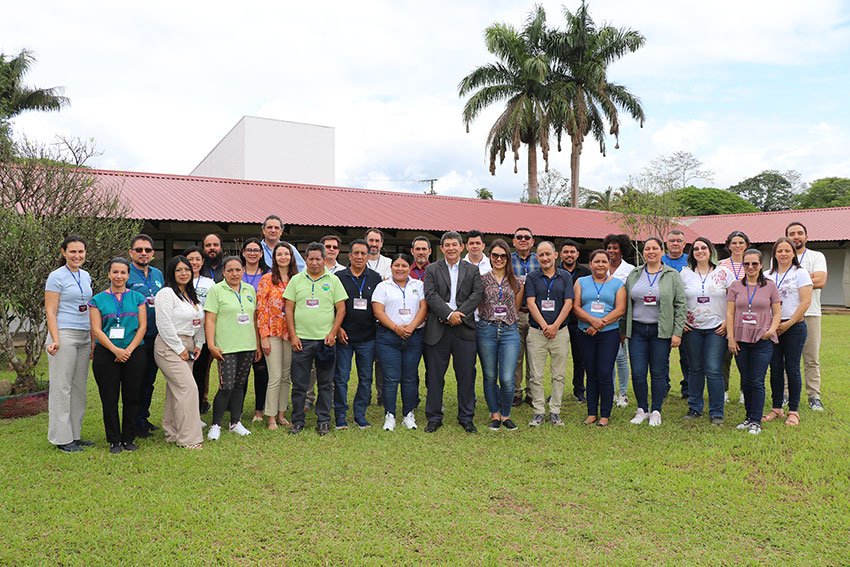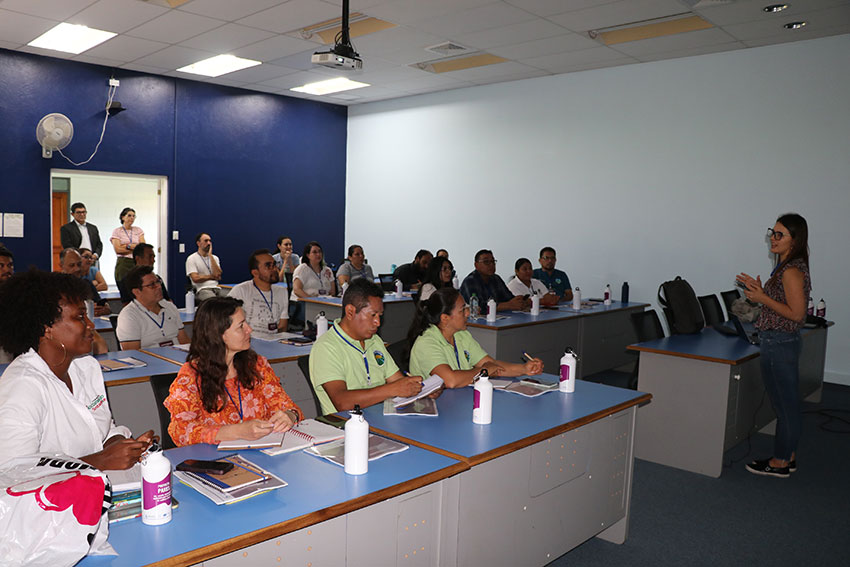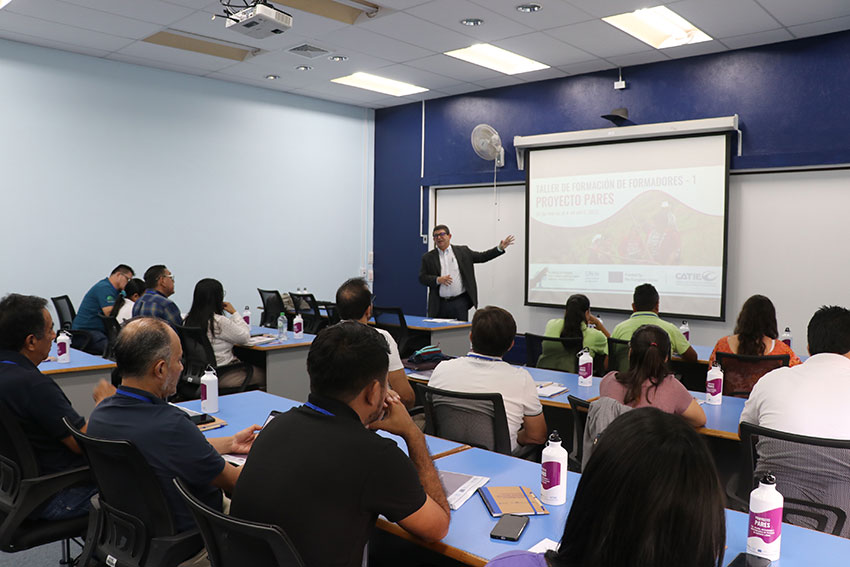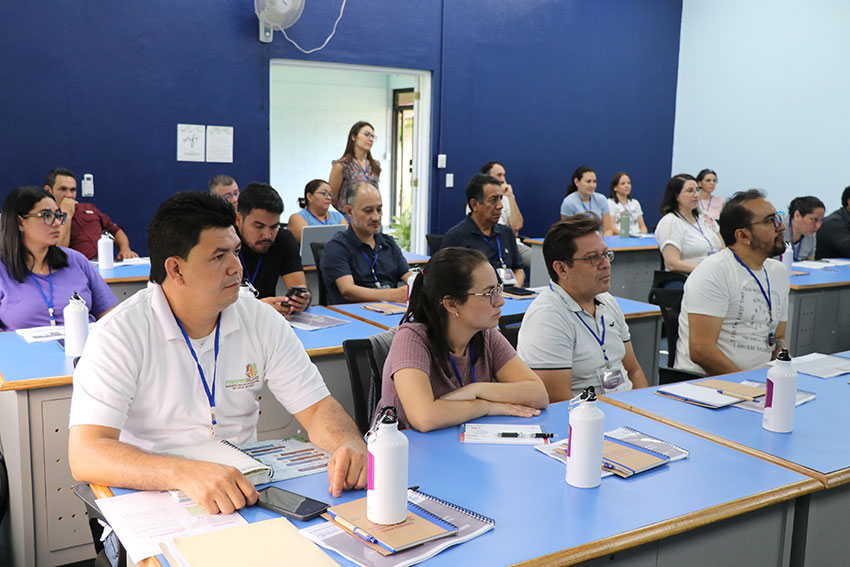International workshop of the PARES project promotes climate resilience and peace strategies in Latin America

- Representatives from 12 organizations across six countries participate in a training space to strengthen their capacity for action in strategic landscapes of the region.
On March 31, the Training of Trainers (ToT) Workshop of the project Peace, Action, Resilience and Sustainability in Latin American Landscapes (PARES) began at the headquarters of CATIE (Tropical Agricultural Research and Higher Education Center) in Costa Rica. The workshop is designed to strengthen strategies for climate resilience, stability, and peace in Latin America.
Over the course of five days, representatives from Mexico, Guatemala, Honduras, El Salvador, Colombia, and Ecuador will receive training in territorial planning, climate adaptation, and landscape governance, with a focus on Nature-based Solutions (NbS) to reinforce security and stability in their territories.
“This workshop is a space to learn together, share experiences, and strengthen our understanding of the links between peace, security, and climate change,” highlighted Ileana Ávalos, coordinator of the PARES project.

From theory to territory: training with impact
The workshop combines theoretical sessions with a field visit, allowing participants to apply the knowledge acquired in a real-world context and enhance their action strategies in the prioritized landscapes.
This knowledge will enable them to conduct comprehensive diagnostics in their territories and design a portfolio of Nature-based Solutions (NbS) together with the communities. As part of the PARES project, a pilot initiative from each portfolio will be selected, funded, and implemented between September 2025 and 2026 in each of the prioritized landscapes.
In addition, each organization must replicate these learnings by conducting diagnostic workshops with local communities. They will also implement participatory processes to identify resilience strategies in the face of environmental, social, and security challenges, contributing to the consolidation of a regional community of practice.
Dr. Luis Pocasangre, Director General of CATIE, emphasized the importance of this space as a key opportunity for implementing partners to strengthen their capacities and build joint strategies to address the challenges of climate resilience, peace, and security in the region. “You, as trainers of trainers, are a key piece in development. This workshop represents a great responsibility, but also a valuable opportunity: it is a space for dialogue, to share challenges, and build joint solutions,” stated Dr. Pocasangre.
As one of the workshop participants, Lina Isabel Rincón, from the Sustainable Biotrade Corporation, noted that these spaces allow for an integrated analysis of different territories, the opportunity to learn new things, and to identify how to support the most vulnerable communities.
Juan Calderón, from the PUCA Community Foundation, commented: “Being in this workshop is a great opportunity because it allows us to respond to the needs in our territory, make them known, and identify financial sources that can complement the efforts we are already making.”
The event also featured the virtual participation of Celia Halle, Manager of the UNEP-EU Climate Change and Security Programme, who highlighted the importance of strengthening territorial resilience in Latin America. “I am pleased to welcome you to this workshop, which marks the true beginning of our PARES project. We have seen the challenges each of you face in your landscapes, and we are truly excited to support you in implementing the solutions proposed in your applications,” Halle noted.

To develop the workshop, an innovative methodology is being used that integrates participatory mapping—developed by CATIE’s Climate Action Unit—with UNEP’s peace-security and climate change approach. “This combination enables an in-depth analysis of landscape vulnerability and fragility,” Ávalos explained.
The organizations selected to participate in the workshop were chosen through a competitive process that received 190 applications. The evaluation was conducted by a technical team from CATIE, prioritizing those with experience in landscape management, influence in local decision-making, and commitment to resilience and peace approaches.
“The selection of these organizations responds to the need to ensure that the project’s impact is sustainable and replicable. We are convinced that these partnerships will strengthen local capacities and enable the development of effective solutions for restoration and stability in the region,” Ávalos added.
Challenges and opportunities in prioritized landscapes
The prioritized territories face multiple challenges, such as environmental degradation, the impact of climate change on livelihoods, and socio-environmental conflicts over access to natural resources. In some cases, insecurity and migration have further exacerbated the socioeconomic fragility of communities.
To address these challenges, the PARES project combines climate action, conflict sensitivity, and the promotion of a culture of peace, ensuring that solutions are contextualized and viable. This project is implemented by the European Union (EU), the United Nations Environment Programme (UNEP), and CATIE in Latin America.
Through this workshop, the PARES project advances in the construction of resilient, sustainable, and community-centered strategies, strengthening environmental governance and promoting Nature-based Solutions to address the region’s socio-environmental challenges.

More information:
Ileana Ávalos Rodríguez
PARES Project Coordinator
Climate Action Unit
CATIE
ileana.avalos@catie.ac.cr
Written by:
Karla Salazar Leiva
Communications Officer
Communications and Marketing Office
CATIE
karla.salazar@catie.ac.cr



